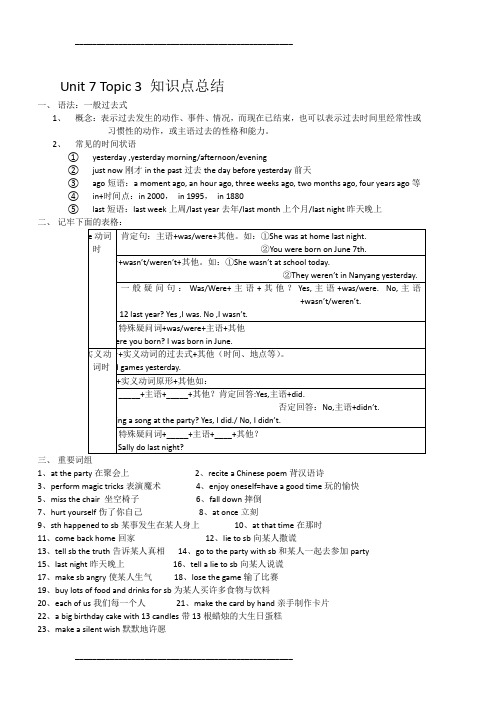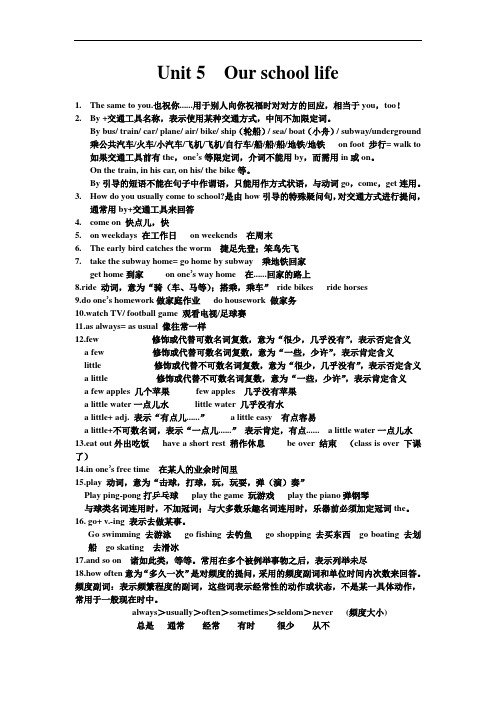仁爱版七年级英语下册知识点总结
- 格式:doc
- 大小:109.50 KB
- 文档页数:14

七年级下英语知识点总结Unit 5 Topic1㈠短语总结1.在学校大门口 at the school gate2.来学校come to school3. 去学校go to school4. 上课have class / have classes5. 步行on foot6.骑自行车ride a bike/ ride bikes/ by bike / on a bike7.坐公交by bus / take a bus8.坐地铁by subway / take the subway / on the subway9.坐飞机by plane/ take the plane / on the plane10.坐小汽车by car / in a car/ take a car/ drive a car11. 坐轮船by ship12. 坐小船by boat13. 坐火车by train / on the train14. 在我们组in our group15.一群学生a group of students16.我们中的三个人 three of us17.在平日 on weekdays18.在周末 on the weekends / at weekends19.起床 get up20.睡觉 go to bed21.早起 get up early22.回家 go home23.到家 get home24.去动物园 go to the zoo25.去公园 go to the park26.看电影 see a movie / film27.看电视 watch TV28.在晚上 in the evening / at night29.帮助父母 help parents30.做某人的家庭作业 do one’s ( my/ her/ his/ your/ their)homework31.在学校 at school32.知道 ,了解 know about / learn about33.校园生活 school life34.一个美国学生 an American student35.在美国 in America / in the U.S.A.36.许多学生 many students/ a lot of students/ lots of students37.很少 very few38.吃午饭 have lunch39.出去吃饭 eat out40.在校期 on school days41.休息一会 have a short rest/ break42.午后 after lunch43.在某人的余 in one’s ( my/ his/ her/ their⋯)free/ spare time44.打球 play basketball45.踢足球 play soccer / football46.琴 play the piano47.吉他 play the guitar48.拉二胡 play erhu49.去游泳 go swimming / go for a swim50.去划船 go boating51.球 a ball game / ball games52.一年四次 four times a year53.听音 listen to music54.read books55.看 read newspapers56.看医生 see a doctor57.去 go to the library58.一周两次 twice a week59.朋友 meet friends60.每天 every day61.在七点半 at half past seven62.一小会 for a little while / for a short time63.晚后 after supper64.吃 have dinner65.吃早 have breakfast㈡重要句型1.I usually come to school by subway.同句 : I usually take the subway to school.划部分提 : How do you usually come to school?似的有:go to school by bike=go to schoolon a bike= ride a bike to school=ride to schoolgo home by bus=go home on a bus=take a bus home2.How do you usually/ often⋯?你通常 /常怎⋯?3.It ’stime for class.=It’s time to have class. =It’s time for having class.4.What about you? =How about you?5.How often ⋯? 率,回答可以用率副: always, usually, often,sometimes, seldom, never, every day ,every +其他名或表示率的短回答表示率的短:次数 +位e.g. : once a day / twice a week / three times a month6.The early bird catches the work. ( ) 笨先7.Work / Study must come first. 工作 / 学必放在第一位!8. Classes begin at eight. =Class begins at eight.提问:What time does the class begin? / What time do the classes begin?㈢重要单词的用法1.look (感官动词 ) 看起来,后面加形容词His mother looks very young.They look very cute.Her dress looks very nice.You look very cool in this coat.2. by 介词by 后面直接加表示交通工具的名词,中间不用任何词修饰,如: by bike by +动词 ing 形式,表示通过某种方式People show love to their mothers by giving cards.You can be a good student by working hard.3.over (形容词 ) School/ Class is over.4.begin现在分词 : beginning 过去式 : beganbegin to do sth , begin doing sthHe begins to write a letter. =He begins writing a letter.如果 begin 本身为分词,只能用begin to do sthHe is beginning to run.5.listen to 听(动作), hear 听见 (结果 )6.always 反义词 never7.本话题涉及的时态为一般现在时,句中常有频率副词或表示频率的短语,如果主语为三单,动词一定要用三单!(四)易错题1.You new watch ______ (look) very nice!2.Here ______(be) some news.3.Oh, come on! It’s time_____ going to school.4.They usually go to school on ________(feet).5.In my class, forty of _______(we) go to school by bike.6.The early bird ______ (catch) the worm.7.Kangkang often _____ (ride) a bike to the park.8.What time _____ (be)school over?9.Work must come ______(once).10.It ’stime ____you to get up.11.We often _____ books in the morning.12.Jill ’s friend like ______(study) in our school.13.Mr. Wang teaches ______(we) English. _____ of us like him.14.How about ______(go) out with me?15.Most students go to school _____ the school bus.16._______ do you go shopping with your mother?A. How soonB. How farC. How oftenD. How much17. What time do you usually get up _____ weekdays?18. He ______ busy, so he has no time to play with us.A. is alwaysB. seldom isC. always isD. often is19.The last class______(finish) at twelve o’clock.20.Let’s go______(boat).21.It’stime to have breakfast. 同(义句 )______________________________________________________.22.Michael often rides a bike to school. 同(义句 )______________________________________________________.23.I always go to work on foot. (对划线部分提问 )______________________________________________________.24.My mother goes shopping twice a week. 对(划线部分提问 )______________________________________________________.25.Mary always reads books in the library. 反(义句 )______________________________________________________.26.He usually does his homework at school.否(定句 )______________________________________________________.27.They often go to school by bus in the morning. 对(划线部分提问 ) ______________________________________________________.28.Jane seldom watches TV on weekdays改.(为一般疑问句 )______________________________________________________.29.He usually has lunch at home. 对(划线部分提问 )______________________________________________________.30.Li Ping often goes to work on foot. (同义句 )______________________________________________________.31.几乎没有学生乘地铁去学校。

Unit7 Topic2 Section A学习目标1.学习can/can't的用法,学会谈论某人能够和不能够做的事情,并进行才艺展示。
2.学习并掌握选择疑问句的用法。
重点短语1.play the piano/guitar 弹钢琴/吉它2.perform ballet 表演芭蕾舞3.dance to disco 跳迪斯科4.at the party 在晚会上5.have a good time=enjoy oneself=have fun 玩得高兴,过得愉快名师课堂1.Do you want to sing Chinese songs or English songs?你想唱中文歌还是英文歌?由or构成的选择疑问句,其结构是一般疑问句或特殊疑问句加选择部分,选择部分用or连接,回答时不用Yes或No,而是直接选择。
e.g.-Do you want to play basketball or soccer?你是想打篮球还是踢足球?-I want to play soccer.我想踢足球。
2.But I can't sing Chinese songs.I can only sing English songs.但是我不会唱中文歌,我只会唱英文歌。
can 是情态动词,不能单独作谓语,只能和动词一起构成谓语,没有人称和数的变化,表示“能,会”之意。
含有can的陈述句变为否定句时,直接在其后加not,缩写为can't.含有ean的陈述句变为疑问句时,只需要把can 提前大写目子母,答语通常为Yes,主语+can./No,主语+can't.,有时也用一些程度的词来回答。
e.g - Can you play the piano?你会弹钢琴吗?-Yes,I can,/No,I can't,是的,我会。
/不,我不会。
(Yes,a little./No,not at all.是的,会一点。

Unit 7 Topic 3 知识点总结一、语法:一般过去式1、概念:表示过去发生的动作、事件、情况,而现在已结束,也可以表示过去时间里经常性或习惯性的动作,或主语过去的性格和能力。
2、常见的时间状语①yesterday ,yesterday morning/afternoon/evening②just now刚才in the past过去the day before yesterday前天③ago短语:a moment ago, an hour ago, three weeks ago, two months ago, four years ago等④in+时间点:in 2000,in 1995,in 1880⑤last短语:last week上周/last year去年/last month上个月/last night昨天晚上二、是三、1、at the party在聚会上2、recite a Chinese poem背汉语诗3、perform magic tricks表演魔术4、enjoy oneself=have a good time玩的愉快5、miss the chair 坐空椅子6、fall down摔倒7、hurt yourself伤了你自己8、at once立刻9、sth happened to sb某事发生在某人身上10、at that time在那时11、come back home回家12、lie to sb向某人撒谎13、tell sb the truth告诉某人真相14、go to the party with sb和某人一起去参加party15、last night昨天晚上16、tell a lie to sb向某人说谎17、make sb angry使某人生气18、lose the game输了比赛19、buy lots of food and drinks for sb为某人买许多食物与饮料20、each of us我们每一个人21、make the card by hand亲手制作卡片22、a big birthday cake with 13 candles带13根蜡烛的大生日蛋糕23、make a silent wish默默地许愿24、blow the candles out in one breath一口气吹灭蜡烛25、it’s your turn轮到你了26、it’s one’s turn to do sth轮到某人做某事27、enjoy doing sth=like doing sth喜欢做某事四、重要句型1、How was Kangkang’s birthday party? It was very nice.康康的生日party怎么样?它很不错。

(仁爱版)英语七年级下册知识点归纳Unit 5 Topic1重点语法一般现在时(常与频度副词never, seldom, sometimes, often,usually, always等连用)重点句型—How do you usually come to school?—I usually come to school by subway.—How often do you go to the library?—Once/Twice/Three times a week/Very often/Every day/Sedom重点详解1.I always come to school by bus.by+交通工具名称,表示使用某种交通方式,中间不加限定词,如果交通工具前有a, the, my 等限定词,就不能用by,而是用in或是on.on the train=by train on his bike=by bike in my car=by car.巧辩异同on foot 与walk on foot “走路”,是介词短语,不能作谓语,只作方式状语,位于句末。
walk “走路”,是动词,可以作谓语。
go to…on foot= walk to I often go to school on foot. =I often walk to school.同样,go to….by bike = ride a bike to go to…. by car = drive a car to go to … by plane = fly to go to… by bus = take a bus to2 .Come on! It’s time for class. come on “快点,加油,来吧”。
It’s time for sth. “该做某事了”,与It’s time to do sth.意思一样。
3 .look的短语look the same看起来一样look like看起来像……look for寻找look after 照顾4 .do my homework at school 在学校做作业do one’s homework 做家庭作业(注意:one’s 要随主语的变化而变化,常用形容词性物主代词my, your, their, our, his, her等)。

Unit 5 Our school life1.The same to you.也祝你......用于别人向你祝福时对对方的回应,相当于you,too!2.By +交通工具名称,表示使用某种交通方式,中间不加限定词。
By bus/ train/ car/ plane/ air/ bike/ ship(轮船)/ sea/ boat(小舟)/ subway/underground 乘公共汽车/火车/小汽车/飞机/飞机/自行车/船/船/船/地铁/地铁on foot 步行= walk to 如果交通工具前有the,one’s等限定词,介词不能用by,而需用in或on。
On the train, in his car, on his/ the bike等。
By引导的短语不能在句子中作谓语,只能用作方式状语,与动词go,come,get连用。
3.How do you usually come to school?是由how引导的特殊疑问句,对交通方式进行提问,通常用by+交通工具来回答e on 快点儿,快5.on weekdays 在工作日on weekends 在周末6.The early bird catches the worm 捷足先登;笨鸟先飞7.take the subway home= go home by subway 乘地铁回家get home到家on one’s way home 在......回家的路上8.ride 动词,意为“骑(车、马等);搭乘,乘车”ride bikes ride horses9.do one’s homework做家庭作业do housework 做家务10.watch TV/ football game 观看电视/足球赛11.as always= as usual 像往常一样12.few 修饰或代替可数名词复数,意为“很少,几乎没有”,表示否定含义a few 修饰或代替可数名词复数,意为“一些,少许”,表示肯定含义little 修饰或代替不可数名词复数,意为“很少,几乎没有”,表示否定含义a little 修饰或代替不可数名词复数,意为“一些,少许”,表示肯定含义a few apples 几个苹果few apples 几乎没有苹果a little water一点儿水little water 几乎没有水a little+ adj. 表示“有点儿......” a little easy 有点容易a little+不可数名词,表示“一点儿......”表示肯定,有点...... a little water一点儿水13.eat out外出吃饭have a short rest 稍作休息be over 结束(class is over 下课了)14.in one’s free time 在某人的业余时间里15.play 动词,意为“击球,打球,玩,玩耍,弹(演)奏”Play ping-pong打乒乓球play the game 玩游戏play the piano弹钢琴与球类名词连用时,不加冠词;与大多数乐趣名词连用时,乐器前必须加定冠词the。

七年级下册英语仁爱版知识点总结一、Unit 1 School Life在第一个单元中,我们主要学习了关于学校生活的词汇和短语,例如school subjects, classroom objects, daily activities等。
除了词汇和短语的学习,我们还学习了一些与学校生活相关的句型和语法知识,比如动词的进行时态和一般现在时的用法等。
值得一提的是,我们还学习了如何用英语向他人介绍自己和他人。
这对我们提高英语口语表达能力有着很大的帮助。
二、Unit 2 My Day在第二个单元,我们学习了描述日常生活的词汇和句型。
我们能够清楚地表达一天中的不同活动,并且学会了询问别人的日常活动。
我们还学习了一些常用的时间状语从句和表示频率的副词,以及动词的一般过去时态。
三、Unit 3 Our Hobbies第三个单元主要是关于我们的爱好和业余活动。
在这一单元里,我们学习了描述爱好的词汇和短语,以及询问他人的爱好。
我们还学习了如何用英语表达我们对某些活动感到喜欢或不喜欢,以及介绍他人的爱好等。
通过学习这一单元的内容,我们可以更好地与他人交流,增进彼此的了解。
四、Unit 4 Celebrations第四个单元主要是关于庆祝活动。
我们学习了描述不同庆祝活动的词汇和短语,以及询问别人关于庆祝活动的相关问题。
我们还学习了一些关于时间的表达方式,比如日期、星期、月份等。
我们还学习了一些关于情感的形容词,以及表示祝福的句型和短语。
五、Unit 5 The World Around Us在第五个单元中,我们学习了描述环境和自然现象的词汇和短语,以及相关的句型和语法知识。
我们可以用英语描述不同的自然现象,比如天气、季节等,也能够表达对自然环境的关心和热爱。
除了这些,我们还学习了一些关于地点和方位的词汇,以及表示允许和禁止的句型和短语。
六、Unit 6 Amazing Stories在第六个单元中,我们学习了一些关于神话故事和传奇人物的词汇和短语。
七年级下册英语unit7仁爱版知识点Unit 7主要介绍了购物和做家务的相关语言知识。
以下是本单元的重点知识:
一、购物语言
1.询问价格和折扣:
- How much is it?(这个多少钱?)
- Is it on sale?(打折吗?)
- What's the discount?(有多少折扣?)
2.询问购物需求:
- Can I help you?(需要帮忙吗?)
- What size/color do you need?(你需要什么尺码/颜色?)
- What do you want to buy?(你想买什么?)
3.支付和找零:
- How do you want to pay?(你想用什么方式支付?)- Here's your change.(这是找给您的钱)
二、家务语言
1. 做家务的动词:
- sweep(扫地)
- mop(拖地)
- vacuum(吸尘)
- wipe(擦拭)
- dust(擦灰尘)
- clean(清洁)
- wash(洗)
- iron(熨烫)
2. 做家务的时间:
- on weekends(在周末)
- in the morning(早上)
- after school/work(放学/下班后)
- before bedtime(睡觉前)
3. 表示强调的副词:
- really(真的)
- very(非常)
- extremely(极其)
以上是本单元的重点知识,掌握上述语言知识可以帮助你更好地与他人交流。
希望你能够认真学习,在日常生活中灵活运用。
Unit 5 Our School Lifetopic1How do you go to school?一、重点词语:1. wake up醒来,唤醒get up起床2. go to school去上学go home 回家3. go dancing / shopping / skating / swimming去跳舞;购物、滑冰;游泳go doing something可用于表达去进行某种娱乐休闲活动。
4.表示交通方式:on foot步行by boat坐船by ship坐船by air乘飞机by plane乘飞机by train坐火车by subway搭乘地铁by car坐小汽车by bus坐公共汽车by bike骑自行车5. take the subway / bus / car搭乘地铁;公共汽车;小汽车6. drive a car to work = go to work by car驾车去上班take a bus to work = go to work by bus乘公共汽车去上班go to school on foot = walk to school步行去上学7. ride a bike / horse骑自行车;骑马8. after school / class放学以后;下课以后9. play the piano / guitar / violin弹钢琴;吉他;小提琴play basketball / soccer / football打篮球;踢足球;打橄榄球play computer games玩电脑游戏play with a computer玩电脑play sports做运动10. next to紧挨着,在⋯旁边11. a plan of my school一幅我们学校的平面图12. on weekdays在工作日at weekends在周末13. have breakfast / lunch / supper / dinner / meals吃早餐;中餐;晚餐;正餐;一日三餐have classes / lessons / a meeting上课;上课;开会14. watch TV / movies / games / the animals看电视;电影;比赛;动物read novels / newspapers / books看小说;报纸;书15. wash one ’s face / clothes洗脸;衣服16. 反义词: up – down, early– late近义词:quickly– fastget up early早起be late for迟到17. the first / second / third / fourth day第一;二;三;四天18. clean the house打扫房子19.表示建筑物(尤其学校建筑物):on the playground在操场at school / home / table在学校;家里;桌旁in a computer room / teachers’ office / classroom building / gym / library / lab / canteen在电脑室;教师办公室;教学楼;体操馆;图书馆;实验室;食堂20. around six o’clock = at about six o’clock大约在六点21. 频率副词: never, seldom, sometimes, often, usually, always二、重点句型:1.It’s time to get up.该起床的时候了。
仁爱英语七年级下册unit8 知识点在仁爱英语七年级下册的unit8中,主要学习有关聚会、过生日和购物等话题的词汇和句型。
本文将对其中的知识点进行详细讲解,帮助同学们更好地掌握这些内容。
一、聚会1. invite sb. to sth. 邀请某人参加某事。
例如:I invite you to my party. 我邀请你参加我的聚会。
2. bring sth. to the party. 带某物到聚会。
例如:Don't forget to bring some snacks to the party. 别忘了带一些小吃到聚会上。
3. decorate the room. 装饰房间。
例如:We need to decorate the room before the party. 我们需要在聚会前装饰房间。
二、过生日1. Happy birthday! 生日快乐!2. blow out the candles. 吹灭蜡烛。
例如:Make a wish and blow out the candles. 许个愿望,然后吹灭蜡烛。
3. cut the cake. 切蛋糕。
例如:Let's sing "Happy birthday" and cut the cake. 让我们唱“生日快乐歌”然后切蛋糕。
三、购物1. How much is it? 多少钱?例如:How much is this T-shirt? 这件T恤多少钱?2. Can I try it on? 可以试穿一下吗?例如:Excuse me, can I try on these shoes? 不好意思,我能试穿这双鞋吗?3. I'll take it. 我要买了。
例如:This bag is perfect, I'll take it. 这个包非常完美,我要买了。
以上便是仁爱英语七年级下册unit8的主要知识点,同学们可以通过这些词汇和句型,更好地应对有关聚会、过生日和购物等话题的会话。
[Preview]Grammar:1. Present Simple Tense: The basic form of the verb is used to talk about actions, habits, and general truths.2. Present Continuous Tense: Formed by using the verb "to be" with the present participle ("-ing" form) of the main verb, used to talk about actions happening now or in the near future.3. Past Simple Tense: Regular verbs form the past tense by adding "-ed" to the base form; irregular verbs have their own past tense forms.4. Past Continuous Tense: Formed by using the past tense of the verb "to be" with the present participle ("-ing" form) of the main verb, used to talk about actions in progress in the past.5. Future Simple Tense: Indicates actions that will happen in the future, formed using "will" or "shall" with the base form of the verb.8. Adverbs of Manner: Modify verbs and adjectives, answer the question "How?"9. Expressing Ability: Use modal verbs such as "can," "could," and "may" to talk about ability or permission.10. Articles: "A," "an," and "the" are used to indicate whether a noun is specific or nonspecific.11. Prepositions: Words that show the relationship between a noun/pronoun and other words in a sentence.Vocabulary:2. Verbs and Adjectives: Actions, feelings, descriptions, etc.4. Hobbies and Sports: Vocabulary related to leisure activities and sports.5. Jobs and Professions: Vocabulary related to different occupations.6. Places: Vocabulary related to different locations and buildings.8. Environment: Vocabulary related to nature, pollution, and conservation.Reading:2. Skimming and Scanning: Techniques for quickly locating information in a text.3. Inferred Meaning: Inferring information from context clues.4. Making Inferences: Drawing conclusions based on information provided.5. Critical Thinking: Analyzing and evaluating text to form opinions and make judgments.Listening:2. Listening for Specific Information: Identifying key details or specific information in spoken English.3. Understanding Dialogue: Listening to conversations and understanding the roles and intentions of the speakers.4. Listening for Inferred Meaning: Inferring informationthat is not explicitly stated from the context.Speaking:1. Dialogue Practice: Engaging in conversations with classmates or teachers to practice spoken English.3. Pronunciation: Practicing correct pronunciation of words and sounds.4. Fluency: Developing the ability to speak English smoothly and confidently.Writing:1. Sentence Structure: Writing sentences with proper grammar and word order.2. Paragraph Writing: Organizing ideas and writing coherent paragraphs.3. Descriptive Writing: Using adjectives and sensorylanguage to describe people, places, and things.4. Narrative Writing: Writing stories with a clear beginning, middle, and end.5. Letter Writing: Understanding the format and structure of formal and informal letters.7. Editing and Proofreading: Correcting errors in spelling, grammar, punctuation, and sentence structure.。
Unit 5 Our school life1.The same to you.也祝你......用于别人向你祝福时对对方的回应,相当于you,too!2.By +交通工具名称,表示使用某种交通方式,中间不加限定词。
By bus/ train/ car/ plane/ air/ bike/ ship(轮船)/ sea/ boat(小舟)/ subway/underground 乘公共汽车/火车/小汽车/飞机/飞机/自行车/船/船/船/地铁/地铁on foot 步行= walk to 如果交通工具前有the,one’s等限定词,介词不能用by,而需用in或on。
On the train, in his car, on his/ the bike等。
By引导的短语不能在句子中作谓语,只能用作方式状语,与动词go,come,get连用。
3.How do you usually come to school?是由how引导的特殊疑问句,对交通方式进行提问,通常用by+交通工具来回答e on 快点儿,快5.on weekdays 在工作日on weekends 在周末6.The early bird catches the worm 捷足先登;笨鸟先飞7.take the subway home= go home by subway 乘地铁回家get home到家on one’s way home 在......回家的路上8.ride 动词,意为“骑(车、马等);搭乘,乘车”ride bikes ride horses9.do one’s homework做家庭作业do housework 做家务10.watch TV/ football game 观看电视/足球赛11.as always= as usual 像往常一样12.few 修饰或代替可数名词复数,意为“很少,几乎没有”,表示否定含义a few 修饰或代替可数名词复数,意为“一些,少许”,表示肯定含义little 修饰或代替不可数名词复数,意为“很少,几乎没有”,表示否定含义a little 修饰或代替不可数名词复数,意为“一些,少许”,表示肯定含义a few apples 几个苹果few apples 几乎没有苹果a little water一点儿水little water 几乎没有水a little+ adj. 表示“有点儿......” a little easy 有点容易a little+不可数名词,表示“一点儿......”表示肯定,有点...... a little water一点儿水13.eat out外出吃饭have a short rest 稍作休息be over 结束(class is over 下课了)14.in one’s free time 在某人的业余时间里15.play 动词,意为“击球,打球,玩,玩耍,弹(演)奏”Play ping-pong打乒乓球play the game 玩游戏play the piano弹钢琴与球类名词连用时,不加冠词;与大多数乐趣名词连用时,乐器前必须加定冠词the。
16. go+ v.-ing 表示去做某事。
Go swimming 去游泳go fishing 去钓鱼go shopping 去买东西go boating 去划船go skating 去滑冰17.and so on 诸如此类,等等。
常用在多个被例举事物之后,表示列举未尽18.how often意为“多久一次”是对频度的提问,采用的频度副词和单位时间内次数来回答。
频度副词:表示频繁程度的副词,这些词表示经常性的动作或状态,不是某一具体动作,常用于一般现在时中。
always>usually>often>sometimes>seldom>never (频度大小)总是通常经常有时很少从不单位时间内次数:once a week 一周一次twice a week 一周两次four times a year 一年四次①一般在系动词be、情态动词(can,may,must等)或助动词(do,does等)之后,行为动词前。
You must always remember this.②有时为了表示强调,也可以放在句首或句末。
Sometimes I go to the park on foot.③用how often提问We go to the library sometimes.→How often do you go to the library?④频度副词与not连用时,表示部分否定。
We’re not always this busy. 我们并不总是这么忙。
e first 首要,第一20.have......classes 上......课e.g. have an English class 上英语课have classes 上课have breakfast/ lunch / dinner /supper 吃早餐/午餐/晚餐/晚餐(三餐前不宜加冠词)21.for a little while = for a moment 一会儿22.Are you doing your homework? 是现在进行时的一般疑问句,肯定回答:Y es, 主语+Be;否定回答:No, 主语+be+not.(Yes, I am./ No, I’m not.)23.would you like to do ......?你想或愿意做......吗?相当于Do you want to do ......?24.at the moment= now 此刻,现在常用于现在进行时25.May I borrow.......? 是表达请求允许的句型。
May在此表示请求对方下课,常用Yes, please./ Yes, of course. / Certainly.等来做肯定回答。
26.do better in sth./ doing sth. 在.......做得更好do well in sth./doing sth. 在......做得好= be good at sth./doing sth. 擅长于......27.look for 寻找强调找的动作find 找到、发现强调找的结果on the shelves 在架子上shelf 的复数是shelves28. ①borrow 表示主语借进borrow sth. from sb. 向某人借某物lend 表示主语借出lend sb. sth. ( lend sth. to sb.) 把某物借给某人keep 表示借多长时间,意为“保存,保留”②How long 意为“多长时间,多久”how often 意为“多久一次”29. ①return 意为“归还”还可以用give back 来表达。
Return sth. (to sb.)= give sth. back to sb. 把某物还给某人。
Please return the book to me now. = Please give the book back to me now.②on time 意为“准时,按时”30. It’s pleasure. 是回答感谢的客套话,类似的还有:Not at all./ My pleasure./ It’s my please./ That’s all right./ That’s ok.31. Thank you all the same. 是你向别人寻求帮助,但别人无法帮助你时你作的回答。
31.Lost and Found 失物招领处32. Can I help you? 是服务员的参与与,不同场合具有不同的含义。
类似的还有:May I help you?/ What can I do for you?/ Is there anything can do for you?等33.else 意为“别的”,放在疑问词who, what, where 和不定代词something, anything, nothing, somebody, anybody, nobody等后面。
34.put on 意为“穿,戴”强调穿的动作。
当宾语为名词时,此名词可置于put on之间或之后。
Put your coat= put on your coat 穿上你的外衣当宾语为代词时,此代词只可置于puton之间。
35. show sb. around 领某人参观;带某人巡视36.Write a letter 写信write (a letter) to sb.给某人写信write (a letter) back to sb.给某人回信37.at the back of 意为“在......后部”。
指在范围内部的后部38. ①Here are some photos of his. 此句是倒装句。
Here, there等副词置于句首时,经常与go,come等动词连用。
主语如果是普通名词,全句需要完全倒装,主语如果为代词,不需要倒装。
e.g. There goes the bell. 铃响了。
Here he comes. 他来了。
②some photos of his 他的一些照片,此处是双重所有格的用法。
Of后可以是名词性物主代词,也可以是表示具体的人的名词所有格。
A friend of my father’s 我父亲的一位朋友39. ①He looks happy because he loves swimming. 是because引导的原因状语从句,常用来回答why问句。
e.g. Why do you want to visit the Great Wall?→Because it’s very wonderful.②love doing sth. =like doing sth. 喜欢做某事hate doing sth.讨厌做某事40.talk to sb.和某人谈话talk about 谈论41.one day (将来或过去)有一天42. ①现在进行时是由助动词be+doing构成句子的谓语,主要句型如下:肯定句:主语+be+doing+sth.否定句:主语+be+not+doing+sth.一般疑问句:be+主语+doing+sth.?回答:Yes,主语(代词)+be./ No,主语(代词)+be+not.特色疑问句:疑问词+be+主语+doing+sth.?②现在分词的构成规则(1)一般在动词原形末尾加ing work→working(2)以不发音e结尾的动词,去e加ing make→making(3)在重读闭音节词中以一个辅音字母结尾的,先双写这个辅音字母,再加ingput→putting(4)以ie为重读音节结尾的动词,把ie变为y,再加ing。